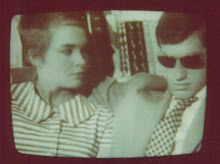
Michael and Trudy recommended this classic and now I am suggesting it to anyone who reads this. It's funny and full of quotable lines.
The film opens with these words...
In Paris during the wonderful days when a siren was a brunette not an alarm and if a frenchman turns out the light it was not on account of an air raid.
Greta Garbo is a stern comrade who does everything by the book...soviet-style. She is sent to Paris to arrange the sale of some of the Grand Duchess's jewels for the government. Three of her comrades are there as well, meeting the sophisticated world of Paris like children.
During the visit she meets Count Leon (Melvyn Douglas) who is the Duchess's lawyer. He greets her at the airport and tries to help with her bags. "Don't make an issue of my womanhood," she says. He is smitten and slowly-but-surely melts her heart just a bit as she meets materialistic Paris with disdain. She rejects paying for the pricey hotel that was arranged for her, as the amount is equivalent to the cost of seven cows for the Russian people.
Greta Garbo's Ninotchka is a complete feminist before the word had been imagined. She appears braless throughout the movie, an unusual sight in hollywood, except for a few offbeat films during the 1970s. Early in the film she remarks on a strange stovepipe-shaped hat on display. "How can a civilization survive that allows women to put things like that on their head?"
She approaches siteseeing with full seriousness. "I'm interested in the Eiffel Tower from a technical standpoint." As Leon pushes forward in his effort to woo her, she says "Must you flirt? Suppress it!" and adds "Love is a romantic designation for an ordinary biological impulse."
When he asks "What kind of girl are you, anyway?" She replies solemnly "A tiny cog in the wheel of evolution." Leon is the consummate romantic who says things like. "Look at the clock...one hand meets the other hand and they kiss...it's midnight and one half of Paris is making love with the other half." Ninotchka easily brushes aside such a remark with "You merely feel that you must put yourself into a romantic mood to add to your exhileration."
At an ordinary restaurant she orders raw beets and carrots. The waiter is apalled and says "Let me bring you a nice little lunch." Leon does eventually crack her open in laughter when he falls off his chair. She begins to warm up and love life a little more with Leon's help. "I always felt a little hurt when the swallows left in winter for the capitalistic countries and now I know why...we have the high ideals and they have the warm climate."
Another Leon come-on..."It's nine o'clock and one half of Paris is saying to the other half...Do you have plans?" He opens a bottle of champagne, more indulgence than she could ever imagine. "I was brought up on goatsmilk and ration of vodka in the army."
As the melting of icy Ninotchka progresses we see her share with a girlfriend a souvenir from Paris. Smiling, she takes out of a box the once-silly stovepipe hat that make her glow for the moment she allows herself to place it on her head. She learns to be happy.
Back home in Russia, she sets the table for a small dinner party for the three comrades and tells a roomate she is preparing an omelette, an obvious challenge when one is rationed just one egg. She explains that she has saved two eggs...and we watch the men arrive with their own egg packed in a tiny box. Ninotchka sums up the Soviet moral of this tale. "If you stand alone you eat a boiled egg. If you stand with your comrades you eat an omelette."
She also wear home a silk and lace slip from Paris that she washes and nearly undermines the entire soviet cause as the comrades see it hanging on the clothesline to dry. She explains to the friend with a bit of excitement that people change their clothes rather frequently in Paris...women typically go from negligee to home frock to evening dress in the course of a day. The friend asks to borrow the lovely silk negligee for her upcoming honeymoon. Ninotchka gives it to her with new happiness.
Leon is back home missing her with Karl Marx on his nightstand and comments that he feels good...like he's making a contribution...when he makes his bed each morning. Ninotchka eagerly greets the mail, but sadly discovers his letters are entirely censored and unreadable. Her friend tries to comfort her and says "They can't censor our memories , can they?" The three comrades open a restaurant that serves borscht and beef stroganoff with the help of financial backing from Count Leon.
All ends well.







